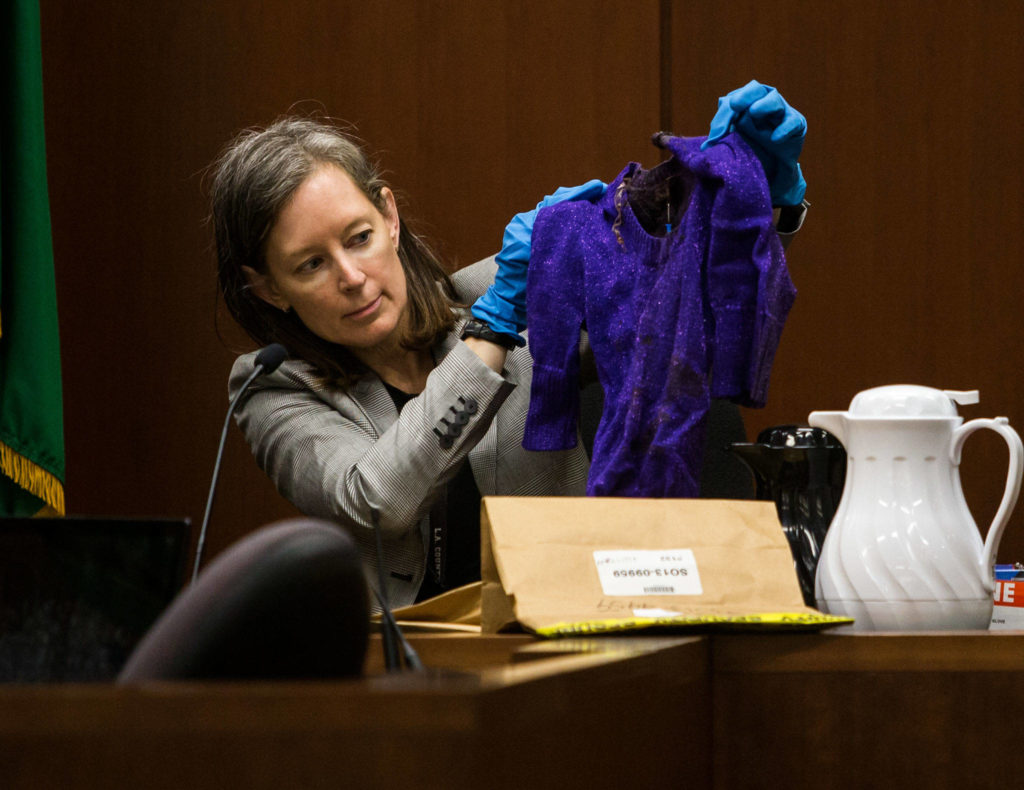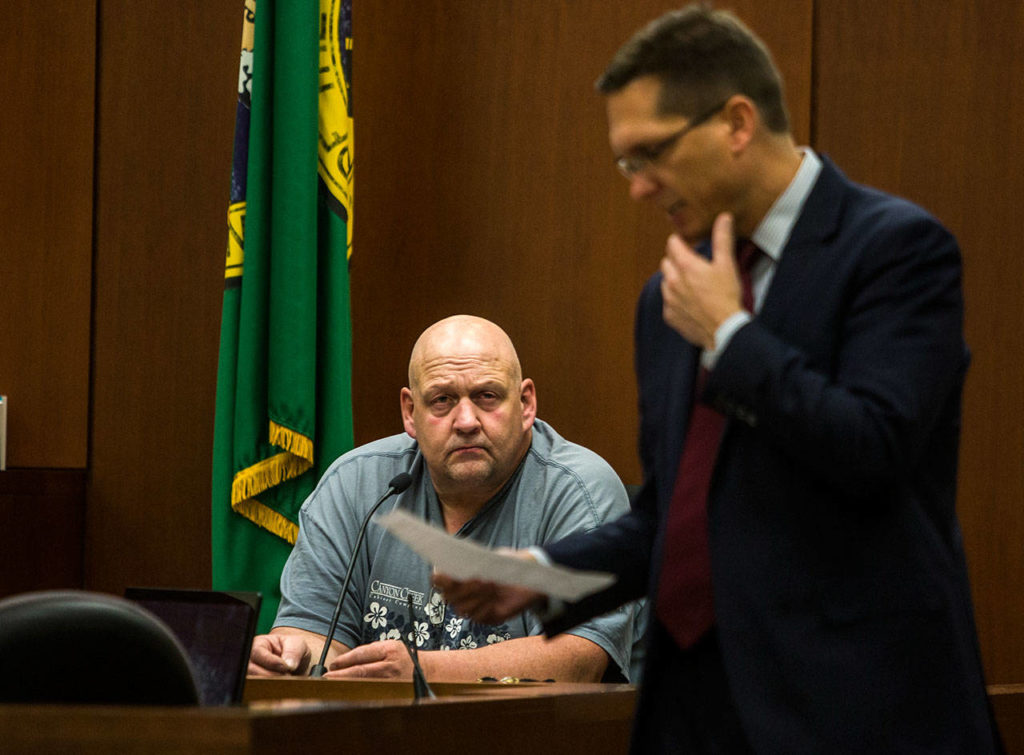EVERETT — Six years ago, a bail bondsman and his teen daughter entered a Lake Stevens house with no power and no running water.
One of his clients, Lance Cleator, 35, was in jail on a warrant, and Cleator wanted to ensure his stuff was safe in the home he’d rented on 15th Street SE.
The bondsman, Nate Hingson, noted signs of a break-in that day in June 2013, according to testimony in a murder trial last week. It seemed someone had kicked in the door, and the home looked like it had been ransacked. Hingson walked upstairs with his daughter. He noticed someone had swiped a big screen TV from the bedroom. Curtains blocked out the sunlight.
The girl noticed the body first.
“Who’s on the bed?” she recounted saying, in tears on the witness stand.
Phillipa Lopez-Evans’ limbs had been tied to the four posts of a bed with electrical cords. Cloth covered her face. She’d been gagged, stabbed more than 24 times and had her throat slashed.
She was 20.
Hingson and his daughter could not see the wounds in the dark room. He told the teen not to touch anything. He shouted to see if the restrained woman would react, according to his testimony. She did not. They backed away and called police.
Prosecutors called witnesses last week who suggested the apparent break-in had nothing to do with the brutal killing, and instead the two crimes happened to occur at the same home in the span of a few days.
Detectives believe Lopez-Evans was killed by Anthony Garver, a mentally ill man from Spokane, following a chance meeting at a McDonald’s in Everett on June 14, 2013.
Security cameras caught both of them together in the restaurant that morning, according to the charges.
Afterward, they spent more than two more hours together in a Walmart, from 4:10 a.m. to 6:45 a.m. A receipt in Lopez-Evans’ purse suggested she stopped at another McDonald’s in Lake Stevens at 7:30 a.m.
Security footage confirmed a man, later identified as Garver, was with her at the second McDonald’s that morning too, the charges say.
In the meantime, DNA on an electrical cord came back as an apparent match for Garver, a felon. He’d served time in a federal prison for having about 100 rounds of ammunition for an AK-47, after being committed to a mental institution.
Detectives exhausted usual efforts to find the suspect that summer, and began showing Garver’s photo to people on the street. On July 2, 2013, police got a tip that he liked to hang out at a particular McDonald’s in Everett. An hour later, he walked through the doors and sat down with a laptop. Police converged on the restaurant and arrested the suspect.
The computer belonged to Evans-Lopez’s boyfriend, Lance Cleator, according to charging papers.
A recorded interview lasted almost 2½ hours at the sheriff’s office. Garver insisted he was his brother, even when a detective showed him a photo of his actual brother. He said he’d met the woman, and that he might’ve even gone to her home, but he denied tying her up and killing her.
Police recovered a knife from Garver’s pocket. Blood in the grooves of the blade came back as an apparent DNA match for Evans-Lopez.
Much of the testimony last week focused on how the body was discovered, and the autopsy that followed.
Defense attorney Jon Scott pressed the bondsman about a series of trips he’d made to the house, in the days before he reported finding the body. According to Hingson, his client owed him money, so he went over to Cleator’s home with strong men to take some valuables, including a Rug Doctor. One of those men happened to have a lengthy felony record.
The felon brought along a friend, a fisherman from Westport, who testified Friday it was done under the eye of Cleator’s girlfriend. The men took enough stuff — shoes, tools and other expensive goods — to fill a truck and a trailer. Under oath, the witness said he and his friend unloaded the stuff in King County, drank some whiskey, and decided to return for more high-dollar items, but without permission this time.
One of Cleator’s vehicles was no longer out front, so the men figured no one was home, the witness said on the stand. The fisherman kicked in the door, he said. He recalled marching upstairs to grab the big screen TV, and they loaded it into the cab of a truck. They grabbed a heavy generator too, he testified.
He said it would’ve been after midnight, in the early morning of Friday, June 14. That’s about same time when Evans-Lopez was seen on camera with Garver.
It wasn’t until about a week later that he learned the woman was found dead in the bedroom, he said. He hoped it would just go away, and he never contacted the police to admit to the lesser crimes, he testified.
A sheriff’s detective interviewed him months later.
He lied about one thing, he testified. He’d said the door was unlocked. A detective asked if he was sure, and he corrected himself and said he kicked it in.
“Are you a very good liar?” deputy prosecutor Matt Hunter asked him Friday afternoon.
“No,” the man said.
He wasn’t charged with burglary or any other crime.
Garver, 31, has spent much of the past six years in a state mental hospital. His case was dismissed at one point, but charges were refiled in 2017, when prosecutors learned he could be released from custody. Garver waived his right to a jury trial last month. Superior Court Judge Eric Lucas is overseeing the bench trial.
The same judge sentenced Cleator to 8⅓ years in prison in 2014, for dealing heroin and meth. Those crimes were committed before his girlfriend’s death.
Cleator, a brawny man with tattoos on his thick biceps, testified about the layout of the home and the reasons why he was in jail that weekend in 2013.
As he stepped down from the witness stand, he turned to face Garver.
“They’ll be waiting for you in the big house, boy,” Cleator said. “They got a nickname for you and everything.”
The trial is expected to continue Monday.
Caleb Hutton: 425-339-3454; chutton@heraldnet.com. Twitter: @snocaleb.
Talk to us
> Give us your news tips.
> Send us a letter to the editor.
> More Herald contact information.





























